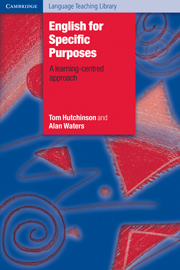12 - Evaluation
Published online by Cambridge University Press: 03 May 2010
Summary
Ah, but a man's reach should exceed his grasp, Or what's a heaven for?
(Robert Browning: ‘Andrea del Sarto’)We noted in the first section of this book that ESP had developed in response to certain pressures. Developments in the theoretical bases of language teaching were indicating a need to pay more attention to the individual learner, and at the same time the worlds of commerce and technology were producing a host of people with specific language learning needs. A demand was generated as a result for courses which would equip particular learners with the necessary skills to carry out particular tasks in English (or any other specified language). These same pressures have generated an equally strong need for a more open and coherent approach to evaluation. Any language teaching course has certain evaluation requirements, but in ESP these requirements are brought sharply into focus by the fact that the ESP course normally has specified objectives. ESP is accountable teaching. ESP learners and sponsors are investors in the ESP course and they want to see a return on their investment of time and/or money. The managers of the ESP course are accountable to these investors. This accountability has produced a demand for more and better evaluation procedures. Two levels of evaluation have thus been brought into prominence:
A Learner assessment. As with any language course there is a need to assess student performance at strategic points in the course, for example, at the beginning and at the end. But this assessment takes on a greater importance in ESP, because ESP is concerned with the ability to perform particular communicative tasks.
- Type
- Chapter
- Information
- English for Specific Purposes , pp. 144 - 156Publisher: Cambridge University PressPrint publication year: 1987



